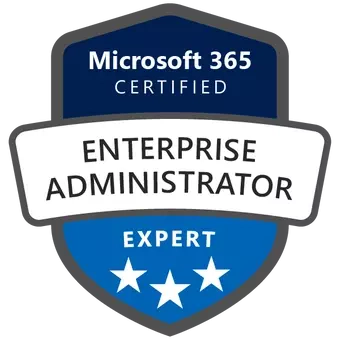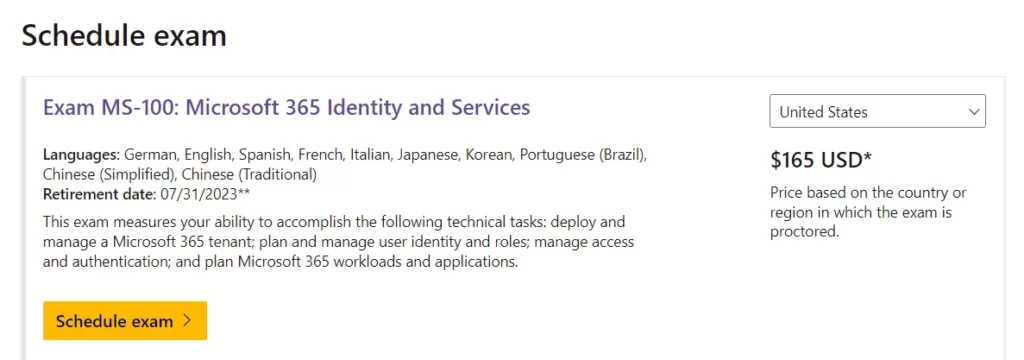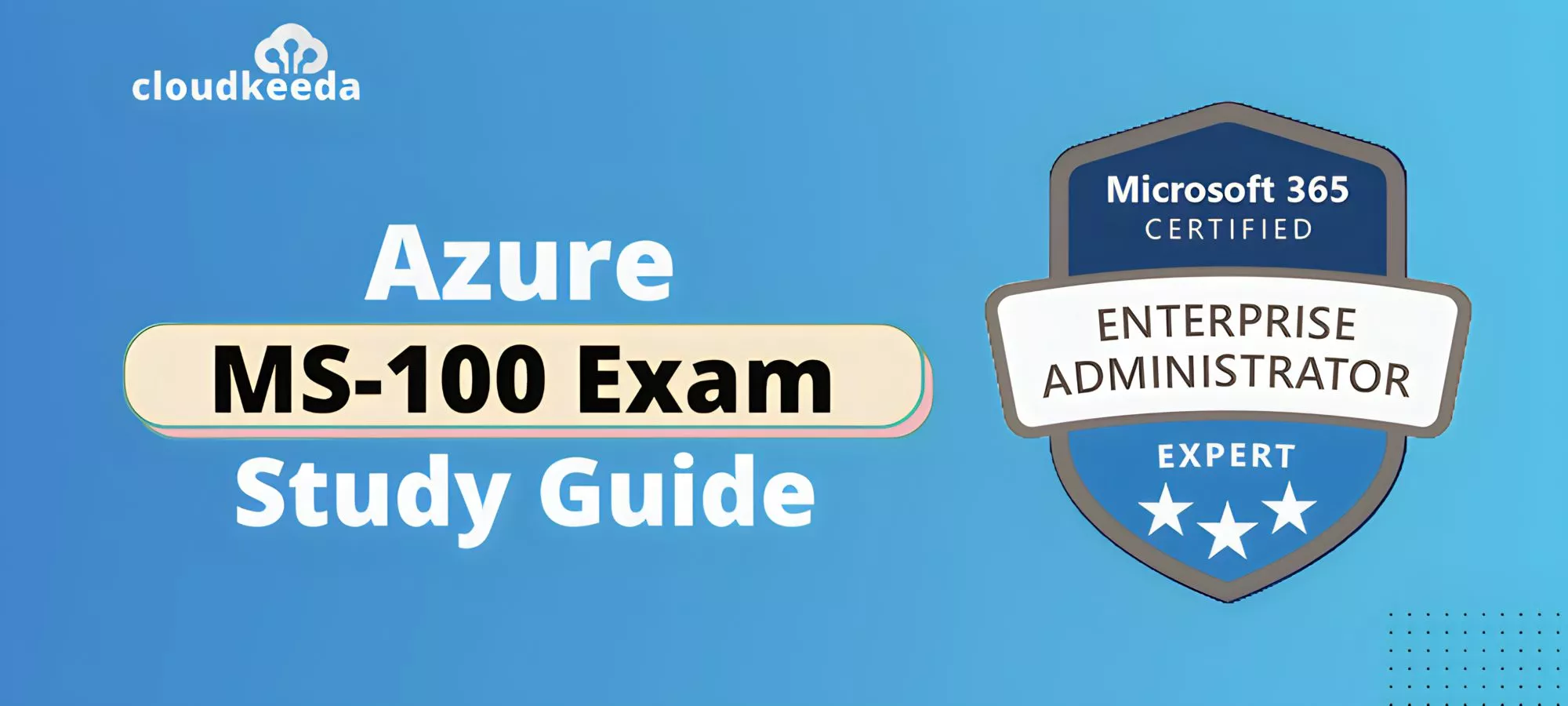Welcome to the world of Microsoft 365 Identity and Services certification! If you’re looking to enhance your skills as a Microsoft 365 Enterprise Administrator, you’ve come to the right place. In this article, we’ll provide you with an informative overview of the MS-100: Microsoft 365 Identity and Services certification.
The MS-100 certification exam validates your expertise in managing user identities and access, implementing security and compliance measures, and ensuring the smooth operation of Microsoft 365 services. It serves as a testament to your capabilities in handling critical aspects of Microsoft 365 environments, making you an asset to any organization.
Let’s dive in and equip ourselves for success in the dynamic world of Microsoft 365.
Table of Contents
MS-100 Certification Overview?
The MS-100 certification focuses on validating your expertise in managing user identities, implementing and managing security measures, and ensuring compliance within Microsoft 365 environments. By earning this certification, you demonstrate your proficiency in essential tasks such as configuring tenant settings, managing user accounts and groups, implementing multi-factor authentication, and planning Microsoft 365 workloads and applications.
Designed for IT administrators, messaging and security professionals, SharePoint administrators, network administrators, and cloud administrators, the MS-100 certification serves as a testament to your abilities in effectively managing Microsoft 365 services.

Throughout the certification journey, you’ll dive into various topics, including Microsoft 365 tenant management, user identity and roles, access and authentication management, and Microsoft 365 workload planning. By mastering these areas, you’ll acquire the knowledge and skills necessary to excel in managing Microsoft 365 services effectively.
The MS-100 certification opens doors to enhanced career opportunities and recognition in the field of Microsoft 365. It validates your skills and expertise, making you an invaluable asset to organizations seeking professionals who can navigate the complexities of Microsoft 365 environments.
Are you new to Azure Cloud? Do check out our blog post on the Microsoft Azure Certification Path and choose the best certification for you.
Take your MS-100: Microsoft 365 Identity and Services exam readiness to the next level with this top-notch practice test. Enroll Now and elevate your chances of passing!
Who This Certification Is For?
The MS-100 certification is designed for individuals seeking to enhance their skills and expertise in managing Microsoft 365 services. It is well-suited for a variety of professionals across different roles and responsibilities in the IT industry.
IT administrators, with their responsibility for managing Microsoft 365 environments, including identity and access management, user and group management, and device management, will find great value in obtaining the MS-100 certification.
Messaging administrators, who handle the management of messaging infrastructure such as Exchange Server and aim to transition to Microsoft 365, can benefit greatly from this certification.
Security administrators, responsible for managing security and compliance solutions in Microsoft 365, will find the MS-100 certification highly relevant to their role.
SharePoint administrators, who oversee SharePoint infrastructure and wish to transition their skills to Microsoft 365, will find this certification beneficial in expanding their knowledge and expertise.
Network administrators, tasked with managing network infrastructure and aiming to integrate Microsoft 365 into their network, will find the MS-100 certification invaluable in their role.
Cloud administrators, responsible for managing cloud infrastructure and seeking to learn how to effectively manage Microsoft 365 services, will find the MS-100 certification instrumental in their professional growth.
Also Read: Our blog post on MS-900 Exam Study Guide
Benefits of MS-100 Certification
Obtaining the MS-100: Microsoft 365 Identity and Services certification offers a wide range of benefits, empowering professionals in the IT industry to excel in their careers and stand out in the competitive job market.
Increased Career Opportunities: The MS-100 certification opens up new doors for career advancement in the field of IT administration, specifically for individuals interested in managing Microsoft 365 environments. With this certification, you demonstrate your expertise and proficiency, making you a highly sought-after candidate for various job roles and responsibilities.
Enhanced Job Performance: The knowledge and skills gained through the MS-100 certification enable professionals to perform their roles with greater efficiency and effectiveness. By understanding best practices for managing user identities, implementing security measures, and ensuring compliance within Microsoft 365, you can optimize processes and contribute to the success of your organization.
Recognition from Microsoft: The MS-100 certification is recognized by Microsoft, one of the leading technology companies in the world. By earning this certification, you gain recognition for your abilities in implementing and managing Microsoft 365 identity and services solutions. This recognition enhances your credibility among colleagues, employers, and clients, opening up new opportunities for collaboration and advancement.
Validation of Skills: The MS-100 certification serves as a validation of your skills and expertise in managing user identities, implementing security measures, and ensuring compliance within Microsoft 365 environments. It provides tangible proof of your capabilities, allowing you to showcase your proficiency to employers and clients.
Personal and Professional Growth: Pursuing the MS-100 certification is a journey of personal and professional growth. It requires dedication, commitment, and continuous learning. Through the certification process, you acquire new knowledge, expand your skill set, and stay updated with the latest practices and technologies in the Microsoft 365 ecosystem.
By earning the MS-100 certification, you position yourself for success in the IT industry, with increased career opportunities, improved job performance, and recognition from Microsoft.
Also Check: Our blog post on MS-700 Exam Study Guide
MS-100 Exam Details
Exam Name MS-100: Microsoft 365 Identity and Services Exam | Passing Marks 700 |
Exam Fee $165 | Exam Duration 100 Minutes |
Exam Validity 1 Year | Exam Languages German, English, Spanish, French, Italian, Japanese, Korean, Portuguese (Brazil), Chinese (Simplified), Chinese (Traditional) |
Total Questions 40-60 Questions | Exam Type Multiple-choice and Multiple response questions |
MS-100 Exam Skills Measured
Deploy and manage a Microsoft 365 tenant | 15-20% |
Plan and manage user identity and roles | 30-35% |
Manage access and authentication | 20-25% |
Plan Microsoft 365 workloads and applications | 20-25% |
How to Register for MS-100 Certification Exam
You can register for the MS-100: Microsoft 365 Identity and Services Exam by going to the Official Microsoft Page.

Microsoft 365 Identity and Services (MS-100) Exam Tips and Tricks
Preparing for the MS-100: Microsoft 365 Identity and Services certification exam can seem challenging, but with the right approach, you can increase your chances of success. Here are some valuable tips and tricks to help you effectively prepare for the exam:
Understand the Exam Objectives: Familiarize yourself with the exam objectives to gain a clear understanding of what will be covered. This will help you focus your study efforts on the key topics and ensure comprehensive preparation.
Utilize Microsoft Documentation and Online Resources: Microsoft provides a wealth of documentation and online resources specifically tailored for exam preparation. Take advantage of these resources, including the Microsoft 365 documentation, Microsoft Learn platform, and the Microsoft 365 certification community. They offer valuable insights, tutorials, and practice exercises to enhance your understanding.
Practice with Hands-On Experience: Acquiring hands-on experience with Microsoft 365 is crucial for success in the exam. Consider setting up a Microsoft 365 tenant and practicing the skills and tasks covered in the exam objectives. This practical experience will strengthen your understanding and ability to apply concepts in real-world scenarios.
Join Study Groups or Find a Study Partner: Studying with others can be highly beneficial. Join study groups or find a study partner to share knowledge, discuss concepts, and ask questions. Collaborating with others not only enhances your understanding but also keeps you motivated and accountable.
Take Practice Exams: Practice exams are valuable tools for assessing your knowledge and identifying areas that require further improvement. Look for official Microsoft practice exams or reputable third-party resources to test your knowledge and familiarize yourself with the exam format and question types.
By following these tips and tricks, you can approach the MS-100 exam with confidence and increase your chances of success. Remember to allocate sufficient time for preparation, maintain a consistent study schedule, and leverage the available resources to maximize your results.
Check Out: Our blog post on MS-203 Exam Study Guide
Prerequisite for MS-100 Certification
Before pursuing the MS-100: Microsoft 365 Identity and Services certification, it is important to ensure that you meet the necessary prerequisites. These prerequisites ensure that you have the foundational knowledge and experience required for a successful certification journey. Here are the key prerequisites for the MS-100 certification:
Practical Expertise in Managing Microsoft 365 Workloads: Candidates eligible for the MS-100 exam should possess practical expertise in managing Microsoft 365 workloads and Microsoft Azure Active Directory, which are integral components of the Microsoft Enterprise. This practical experience equips you with a deep understanding of the Microsoft 365 ecosystem and prepares you for the challenges addressed in the certification.
Experience with Administration of Relevant Technologies: It is highly recommended that candidates have administered at least one of the technologies within the Microsoft 365 environment. This experience provides a solid foundation in networking, server administration, DNS, and PowerShell, which are essential skills for managing Microsoft 365 services effectively.
Meeting these prerequisites ensures that you have the necessary foundation to comprehend and apply the concepts covered in the MS-100 certification. It also enhances your chances of success in the exam and enables you to fully leverage the knowledge gained throughout your certification journey.
If you possess the practical expertise and experience outlined above, you are well-prepared to embark on the MS-100 certification path. Take the next step, enhance your skills, and validate your abilities as a Microsoft 365 Identity and Services professional.
MS-100 Exam Study Guide
Deploy and manage a Microsoft 365 tenant (15–20%)
Plan and implement a Microsoft 365 tenant
- Plan a tenant
- Create a tenant
- Implement and manage domains
- Configure organizational settings, including security, privacy, and profile
Monitor Microsoft 365 tenant health
- Create and manage service requests
- Create an incident response plan
- Monitor service health
- Monitor application access
- Configure and review reports, including Azure Monitor logs and Log Analytics workspaces
- Schedule and review usage metrics, including Microsoft Viva Insights and Adoption Score
Plan and manage user identity and roles (30–35%)
Plan identity synchronization
- Design synchronization solutions for multitenant and multi-forest scenarios
- Evaluate whether objects should be synchronized, not synchronized, or created as cloud-only
- Identify which Azure AD Connect features to enable, such as writeback and device synchronization
- Identify synchronization pre-requisites, including connectivity method, permissions, and server requirements
- Choose between Azure AD Connect and Azure AD Connect cloud sync
- Plan user sign-in for Azure AD hybrid identities, including pass-through authentication, seamless, and SSO
Implement and manage identity synchronization with Azure AD
- Prepare for identity synchronization by using IdFix
- Configure and manage directory synchronization by using Azure AD Connect cloud sync
- Configure and manage directory synchronization by using Azure AD Connect
- Configure Azure AD Connect object filters
- Monitor synchronization by using Azure AD Connect Health
- Troubleshoot Azure AD Connect synchronization
Plan and manage Azure AD identities
- Plan Azure AD identities
- Create and manage users
- Create and manage guest users
- Create and manage groups, including Microsoft 365 groups
- Manage and monitor Microsoft 365 license allocations
- Perform bulk user management, including PowerShell
Plan and manage roles in Microsoft 365
- Plan for role assignments
- Manage roles in Microsoft 365 admin center
- Manage administrative units
- Plan and implement privileged identity management for Azure AD roles
Manage access and authentication (20–25%)
Plan and implement authentication
- Choose an authentication method, including Windows Hello for Business, passwordless, and tokens
- Implement and manage authentication methods
- Implement and manage self-service password reset (SSPR)
- Implement and manage Azure AD password protection
- Configure and manage multi-factor authentication (MFA)
- Investigate and resolve authentication issues
Plan and implement secure access
- Plan and implement access reviews in Azure AD identity governance
- Plan and implement entitlement packages in Azure AD identity governance
- Plan for identity protection
- Implement and manage Azure AD Identity Protection
- Plan conditional access policies
- Implement and manage conditional access policies
Plan and implement application access
- Plan access and authentication to application registrations and Azure AD enterprise applications
- Configure application registration in Azure AD
- Manage user permissions for application registrations
- Manage OAuth application requests in Azure AD, Microsoft Defender for Cloud Apps, and Microsoft 365 Defender
- Configure Azure AD Application Proxy
- Publish enterprise applications in Azure AD
Plan Microsoft 365 workloads and applications (20–25%)
Plan and implement Microsoft 365 Apps deployment
- Plan for client connectivity to Microsoft 365 workloads
- Plan Microsoft 365 App compatibility by using the Readiness Toolkit
- Plan for Microsoft 365 Apps updates
- Specify initial configuration for Microsoft 365 Apps by using the Microsoft 365 Apps admin center
- Implement Microsoft 365 Apps deployment and software downloads
Plan and implement Exchange Online deployments
- Plan for DNS records required by Exchange Online
- Plan and implement an Exchange hybrid organization
- Plan and implement mail routing, including connectors, mail flow rules, and remote domains
- Plan and implement organizational settings
Plan and implement Microsoft SharePoint Online, OneDrive, and Microsoft Teams
- Specify SharePoint site types, site collections, and lists
- Plan a migration strategy for SharePoint Online and OneDrive
- Identify hybrid requirements for SharePoint Online
- Manage access configurations for SharePoint Online and Microsoft Teams
- Manage SharePoint Online tenant and site settings
- Map Phone System features to requirements
- Plan and implement organizational settings
- Plan, implement, and manage guest and external access
MS-100 Exam Retake Policy
- If you do not pass the MS-100 exam on your first attempt, you can retake it.
- A waiting period of 24 hours is required before scheduling a retake.
- If you do not pass on your second attempt, a waiting period of at least 14 days is mandatory
before scheduling another retake:
- Microsoft allows a maximum of five exam attempts per year for a specific certification.
- Utilize waiting periods to reflect, address weaknesses, and enhance your knowledge and skills.
- Approach the certification process with focused preparation and dedication to increase your chances of success in the MS-100 exam and obtaining the Microsoft 365 Identity and Services certification.
Conclusion
In conclusion, the MS-100: Microsoft 365 Identity and Services certification is a valuable credential for IT professionals. By earning this certification, you showcase your expertise in managing user identities, implementing security measures, and ensuring compliance within Microsoft 365 environments.
The certification opens doors to increased career opportunities, improved job performance, and recognition from Microsoft. Leverage available resources, such as documentation and practice exams, to enhance your preparation. Stay committed to continuous learning and embrace the evolving landscape of Microsoft 365.
Good luck on your journey to becoming a certified Microsoft 365 Identity and Services professional!
FAQs
Q1. How long is MS-100 valid?
MS 100 certification is valid for one year from the date of issue.
Q2. How long is the MS-100 exam?
The MS100 exam lasts for 100 minutes.
Q3. How many questions are on the MS-100 exam?
The MS-100 exam consists of 40-60 questions.
Q4. What is the passing score for the MS-100 exam?
To pass the MS 100 exam, you need to score at least 700 points out of a maximum of 1000.
Q5. How much does it cost to take the MS-100 exam?
The MS 100 exam costs $165 USD.

